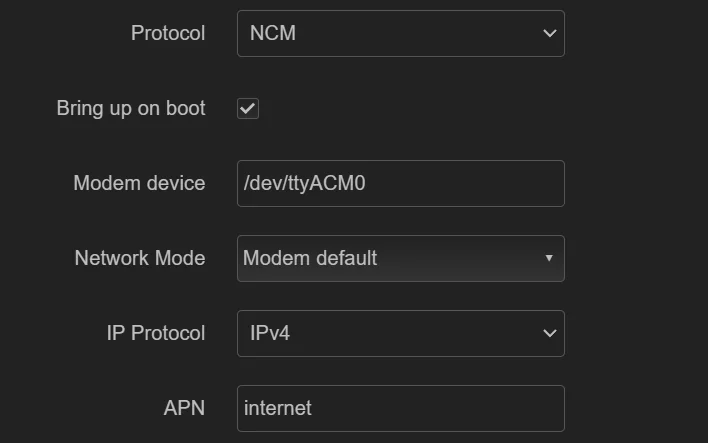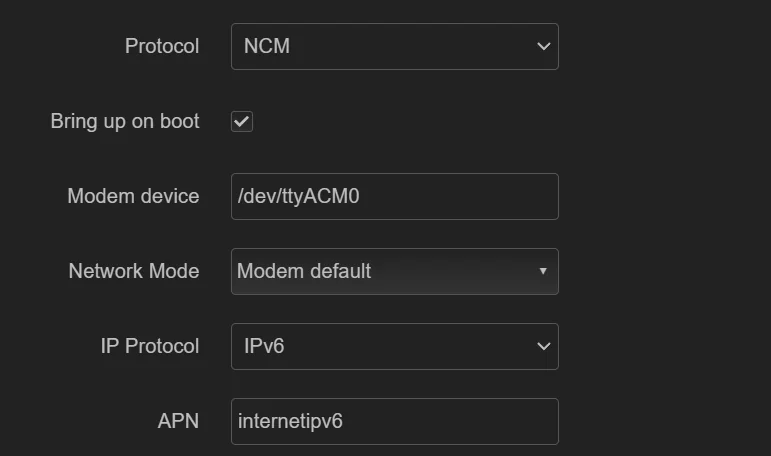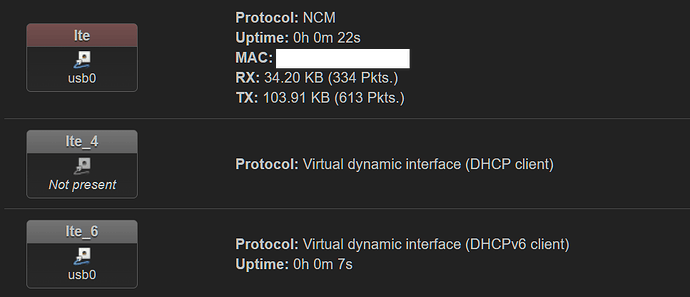Hi, I'm having this issue with OpenWrt.
My setup is a ZTE MF286R with a built-in modem. The modem talks to OpenWrt through NCM.
Now, if I use the old IPv4 APN of the ISP (and IP protocol set to IPv4), it connects and works fine:
However, if I set it to the IPv6-only APN, it fails to obtain a prefix:
As you see, I've left it for a good while, but still no prefix. The usb0 interface for the modem only has a link-local address.
The firewall is set to accept all.
The logs for odhcp6c:
daemon.err odhcp6c[24151]: Failed to send RS (Address not available)
daemon.err odhcp6c[24151]: Failed to send SOLICIT message to ff02::1:2 (Address not available)
And for the mobile interface:
daemon.notice netifd: Interface 'lte' is setting up now
daemon.notice netifd: lte (23752): sending -> AT+CFUN=1
daemon.notice netifd: lte (23752): Configuring modem
daemon.notice netifd: lte (23752): sending -> AT+ZGDCONT=1,"IPV6","internetipv6","",0,0
daemon.notice netifd: lte (23752): sending -> AT+ZGPCOAUTH=1,"internet","internet",0
daemon.notice netifd: lte (23752): Starting network lte
daemon.notice netifd: lte (23752): Connecting modem
daemon.notice netifd: lte (23752): sending -> AT+ZGACT=1,1
daemon.notice netifd: lte (23752): Setting up usb0
daemon.notice netifd: Interface 'lte' is now up
daemon.notice netifd: Interface 'lte_6' is enabled
daemon.notice netifd: Interface 'lte_6' has link connectivity
daemon.notice netifd: Interface 'lte_6' is setting up now
user.notice firewall: Reloading firewall due to ifup of lte (usb0)
If I run odhcp6c usb0 manually, it just hangs forever. The APN settings are definitely correct, they work on another device and my ISP supports IPv6.
Sending AT+CGCONTRDP to the modem only returns a link-local address and the IPv6 DNS of my ISP. No GUA prefix. This particular ISP assigns a standard /64 prefix - it works on an Android device, including the hotspot with a /64.
One thing that's odd is that setting the "IP Protocol" to "IPv4+IPv6" (dual-stack) on the IPv4-only APN also fails to obtain an IPv4 address or IPv6 prefix (!):
I would appreciate any help here on how to get the IPv6 APN working.




